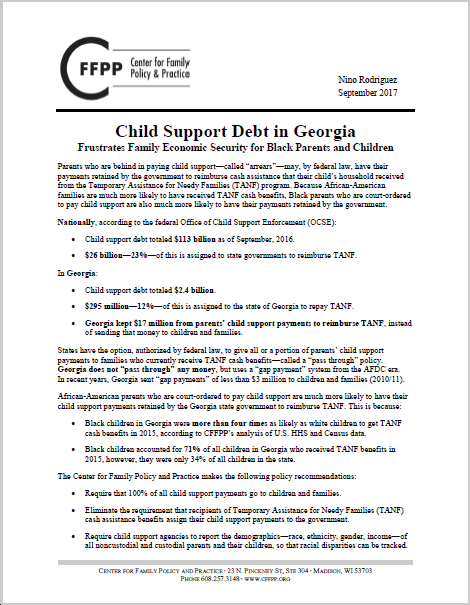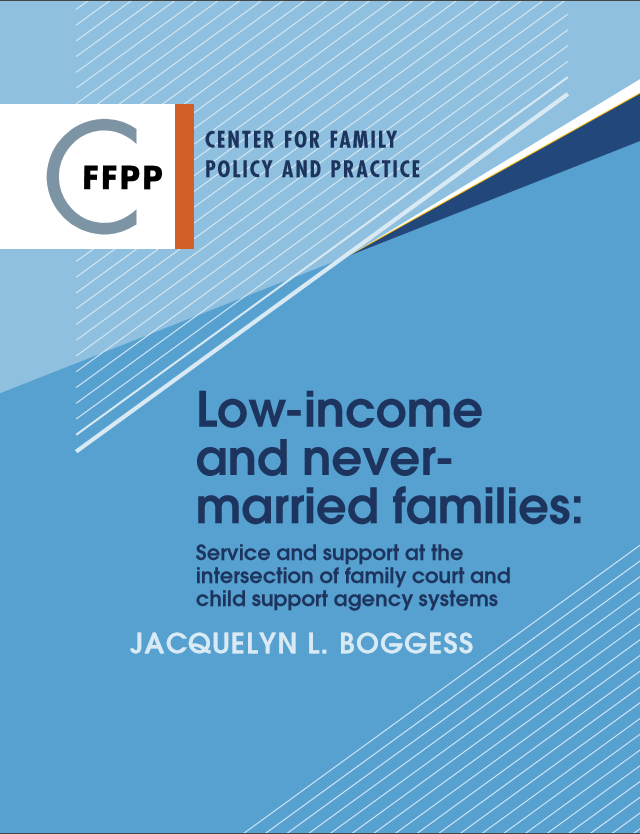FEBRUARY/MARCH 2018 POLICY BRIEFING
IN THIS ISSUE:
• Kentucky Becomes First State to Plan Implementation of Work Requirements for Medicaid Benefits
• States and Local Jurisdictions Reconsidering Cash Bail and Court Fees and Fines
• Florida Could Restore Voting Rights to Ex-Felons Through Court or Ballot
• State Policy and Practice
NOVEMBER/DECEMBER 2017 POLICY BRIEFING
IN THIS ISSUE:
• Charged with Same Crime, Black Male Offenders Receive Longer Sentences than White Counterparts
• Report Examines How Racial Exclusion is Embedded in Welfare Policy
• Ontario, Canada to Test Basic Income as Poverty Reduction Tool
• Child Support Most Prevalent Reason for Wage Garnishment
• State Policy and Practice News
• Also of Note
OCTOBER 2017 Policy Briefing
IN THIS ISSUE:
• Child Support Debt, Employment, and Wages Pre- and Post-Incarceration
• Incomes Improving, but Income Inequality Remains Striking
• Survey Reveals Striking Gaps Among Americans in Beliefs and Levels of Empathy
• Earned Income Tax Credit Can Increase Income and Encourage Work
• Estimates of Progress Toward Racial Economic Equality Depend on Race
• Child Care Deserts Affect the Ability of Rural, Minority, and Low-Income Families to Work
Child Support Debt in Georgia Frustrates Family Economic Security for Black Parents and Children
Parents who are behind in paying child support—called “arrears”—may, by federal law, have their payments retained by the government to reimburse cash assistance that their child’s household received from the Temporary Assistance for Needy Families (TANF) program. Because African-American families are much more likely to have received TANF cash benefits, Black parents who are court-ordered Read MoreSEPTEMBER 2017 Policy Briefing
IN THIS ISSUE:
• Important Things to Know Regarding DACA
• Reforms to Georgia’s Sentencing Laws Result in Drop in Prison Population
• GAO Report Identifies Confusing Array of Eligibility Requirements Among Low-Income Assistance Programs
• Report Identifies Multiple Implications of Medicaid Work Requirements
• Update on TANF at 20 Years Shows Many Shortcomings
• State Policy and Practice News
Low-Income and Never-Married Families: Service and support at the intersection of family court and child support agency systems
State child support enforcement agencies facilitate the legal establishment of paternity for children born outside of marriage, and enforce the payment of child support by noncustodial parents. They are directed to move cash resources from a nonresident parent to the home of his or her child. Ideally, this income transfer provides financial support for children, and security for custodial families. This paper describes how the agency is challenged in the fulfillment of this responsibility by the adversarial nature of its own process, and by the intractable poverty and unemployment (among other barriers to economic security ) of a significant portion of its caseload.
Key points:
• Many noncustodial (mother and fathers) who are unemployed (even long-term unemployed) receive child support orders they cannot pay, based on a presumed earning capacity.
• Current child support policy and practice may be detrimental to economic security and well-being of low-income individuals and families.
• The structure of the US child support system may conflict with the goals of security and stability for children and families.
• Racial inequity and disparities in poverty and unemployment in the US suggest a thorough inquiry into the impact of child support policy and practice on families of color.
JULY/AUGUST Policy Briefing
IN THIS ISSUE:
• Parents Behind in Child Support Payments Suffer Higher Rates of Mental Health Problems
• Environmental Cuts Have Disproportionate Impact on Communities of Color
• States with Greater Minority Populations Provide Lowest TANF Benefits
• Gun Violence Harms Economic Health of Communities
• Thousands of Laws in Southern States Prevent Post-Incarceration Survival
JUNE 2017 Policy Briefing
IN THIS ISSUE:
• Trump Budget Proposal Would Eviscerate Programs for Low-Income Families
• Report Confirms Low-Income Fathers Often Unable to Meet Child Support Obligations and Unlikely to Have Legal Access to Their Children
• Access to Medical Care and Health Outcomes Improve in States that Expanded Medicaid
• Children From Persistently Poor Families Least Likely to Escape Poverty as Adults
• Pretrial Bail and Payment of Traffic Fines Raise Funds for States at the Expense of the Poor
• MDRC Pairs with Fatherhood Programs to Study the Impact of Three Innovations
May 2017 Policy Briefing
IN THIS ISSUE:
• Two Lawsuits Aim to End Practice of Arresting Victims of Domestic Violence
• HHS and States Pushing for Medicaid Work Requirements
• Number of States Imposing New Restrictions on Public Benefits Continues to Grow
• Unprecedented Decline in Home Ownership Among Black Families
• Low-Income Families Increasingly Vulnerable to Utility Shut-Off
• State Policy and Practice News





